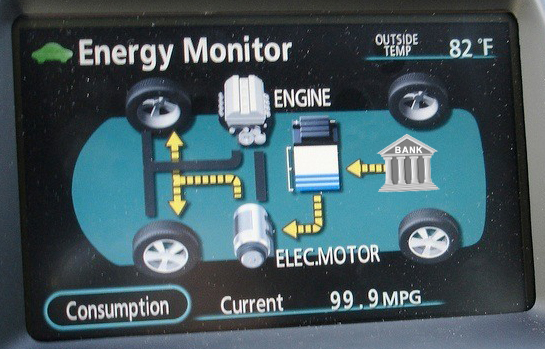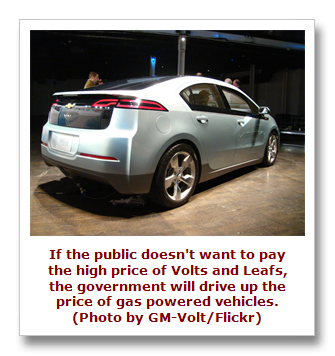Government Uses Gas Efficiency Standards To Push Alternative Vehicles
Gas Prices Don’t Aid Alternative-Fuel Vehicle Sales
Electric and plug-in hybrid vehicles have not done well in the marketplace even with gasoline spiking over the $5 mark in some areas of the country this past year. Both the Nissan Leaf, a totally electric vehicle and the Chevy Volt, a plug-in hybrid, have sold far fewer than expected. The price of the Leaf and the Volt have given consumers pause; so if high-priced gas can’t overcome the cost of alternative fuel vehicles, what’s a government bent on destroying the internal combustion engine to do?
Drive the price of vehicles running on gas skyward and the consumers will flock to these new “green” technologies; or so the liberal reasoning goes.
Over the next few weeks the Obama White House will approve new gas mileage standards that will nearly double the mandated gas mileage for vehicles by 2025. While 13 years might seem a long way off, it’s what happens to gas mileage standards between 2012 and 2025 that have automobile dealers trembling.
Automobile manufacturers are driven by government “fleet standards” that mandate average gas mileage for all their cars, trucks, vans and specialty vehicles; in 2015, just two model years away, that fleet standard will be 54.4 miles per gallon. The 2015 gas efficiency standards have dealers concerned that the accompanying price hikes, in the form of development costs and EPA penalties, will drive away purchasers from an industry already reeling from a weak economy.
The EPA and the National Highway Traffic Safety Administration (NHTSA) have already submitted gas efficiency recommendations to the administration’s Office of Management and Budget (OMB.) In response the National Automobile Dealers Association (NADA) has warned that the ramifications to the industry could be staggering and won’t lead to less gas consumption.
“Dealers support fuel economy increases,” Bailey Wood, spokesman for NADA said, “But if dealers cannot put vehicles on the road, we cannot reduce greenhouse gases or our dependence of foreign oil.”
A final decision on the new gas mileage standards could be issued as early as August 15.
The gas mileage standards are projected by the government to save the average American consumer $8,200 in gas over the life of their vehicles, but would likely add as much as $3,000 to the price of a new vehicle. Before realizing the break-even point, many of these vehicles would be sold meaning the net cost of these savings would be born totally by the initial buyer; furthermore the cost of replacement vehicles would also be greater causing the primary purchaser of every new vehicle to fund the government’s gas mileage standards.
Gas Mileage Standards Might Slow Down Move To Alternative Vehicles
When the cost of vehicles go up people hold on to them longer, especially if it takes a consumer seven or eight years to save enough on gas to cover the increased purchase cost. When people hold on to their vehicles longer the used car market suffers and buyers of used vehicles pay more. The snowball effect means fewer vehicles, new and used, moving off lots further depressing a weak automobile industry; the dominoes fall all the way up to the new vehicle manufacturers who still owe taxpayers tens of billions of dollars.
It’s a self-defeating plan; government action on fuel mileage drives up the price of more fuel-efficient vehicles, causing consumers to hold on to their less efficient vehicles longer; the natural market-based trend towards building more fuel-efficient vehicles without a government mandate, albeit at a slower pace, would lead to less fuel consumption by moving less efficient vehicles to the scrap heap faster.
Though publicly Detroit’s Big Three have voiced support for the new standards, despite costing the industry a reported $157.3 billion, the truth is they’re playing politics. Detroit knows any increase in cost will be passed along to the consumer, so net-net they’ll be okay, whereas opposing the White House generally gets them less government assistance; as always, it’s neither the government nor business that gets screwed, it’s the consumer.
GOP presidential candidate Mitt Romney has said that, if elected, he would look for a better way to improve fuel economy than changing the Corporate Average Fuel Efficiency (CAFE) mileage requirements.
“The best approach is to try and build vehicles that people want, rather than having the government telling the companies what they must make,” he told The Detroit News in June.
“I would work with the manufacturers to find ways to encourage fuel economy on the part of the consumer. But trying to have the manufacturer push the product on the consumer — that the consumer doesn’t want — is not the right approach.”
—————————————————————
Subscribe to Mr. Kaplan’s articles at Examiner.com
Read Mr. Kaplan’s blog at Conservatively Speaking
Email Mr. Kaplan at ken@conservativelyspeaking.us
Join Mr. Kaplan on Facebook at ConservativelySpeaking
Follow Mr. Kaplan’s tweets at ConsSpeaking


